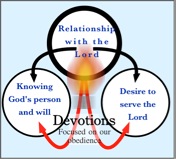Abram was a slow learner. He did not learn for a long time how to apply God’s Word to his daily decisions and so he faltered. If we carefully observe the lessons of his life, we can grow much faster. This is the advantage of gaining wisdom and experience by carefully observing and learning of God’s work from the lives of others.
Prepare your own heart for this message by asking the Lord right now to open your eyes to the life journey that you are on with Him.The effectiveness and fulfillment of one’s life is largely developed by being deliberately attentive to discovering what God wants for our lives through our quiet times with Him and by responding to what He directs us to do.
Of course, God spoke in a special way to Abram. There is no indication that he was seeking God. Even still, when it comes to making those daily decisions in our lives and applying God’s Word, it is only through maintaining a close relationship with the Lord that we will be attentive and responsive to what He wants. We maintain that close relationship by meeting God each day in the Word and prayer.In this study we will look at passages spread throughout Genesis 12-24, but our focus will be on Genesis 12:1-4 below.
“Now the LORD said to Abram, “Go forth from your country, And from your relatives And from your father’s house, To the land which I will show you; And I will make you a great nation, And I will bless you, And make your name great; And so you shall be a blessing; And I will bless those who bless you, And the one who curses you I will curse. And in you all the families of the earth shall be blessed.” So Abram went forth as the LORD had spoken to him; and Lot went with him. Now Abram was seventy-five years old when he departed from Haran” (Genesis 12:1-4).
This is a map of two different things. First of all, it is a geographical outline of Genesis. There are different kinds of outlines. This map gives us a good grasp of the book of Genesis in a few moments. Note the key places mentioned on the map. What chapters in Genesis are they associated with? This map also helps us trace Abraham’s life journey. Starting off in Ur of Babylon (end of Genesis 11), onto Haran (once a flourishing area) and later down into Palestine (land of Canaan) and even Egypt. The larger middle part of the Book of Genesis (chapters 12-36) is recorded to help following generations see how God desires to work in our lives. We must resist the temptation only to learn facts about his life. The facts are cleverly written down to gain a picture of the process of growth. Here are some questions to help you to think about your own life journey.
1. How did God first enter into your own life? Was it a special or normal-like experience?
2. List a spiritual crisis that you have had or are now experiencing. Identify what the actual temptation was. How was your faith tested? Did you endure through the testing? What was God trying to teach you?
3. Temptations (detours) become sin when we fail to trust God for grace and obey Him. When we fall, we need to get up right away. How long have you been a Christian? How has the time from which you fall and the time you repent and confess your sins changed as you have grown as a Christian? How long does it now take you to return to the Lord?
4. Explain the principle of flesh versus the spirit. How is a good understanding of this teaching important to a Christian who walks in the Spirit?
Although Abraham was a great man, the way God worked in his life is very typical of how He works in the lives of all His people. The
following page gives three key points to appreciating God’s will for our lives. Actually, these three parts can be used to describe most of our spiritual journeys. We should be very familiar with them.
Next =>

